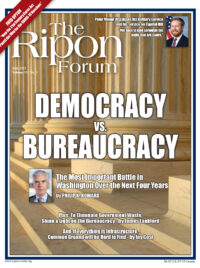 Every game has rules that provide guardrails to keep a contest fair and to allow the better competitor to win. Rules should evolve when the conditions call for it. Baseball, for example, seems in constant rules flux during the offseason and now even during play. For a game to maintain integrity, though, the changes must not intentionally disadvantage one side or bias the referees. Election reform is no different.
Every game has rules that provide guardrails to keep a contest fair and to allow the better competitor to win. Rules should evolve when the conditions call for it. Baseball, for example, seems in constant rules flux during the offseason and now even during play. For a game to maintain integrity, though, the changes must not intentionally disadvantage one side or bias the referees. Election reform is no different.
There is no doubt that the 2020 election saw numerous rules changes, including deep into the election season. While a number of these changes continue to be controversial, these new laws, directives, and rulings were by and large meant to address the unique circumstances of a global pandemic that made large in-person gatherings inadvisable.
The changes in 2020, mostly to increase access to remote voting options like mail-in ballots or to provide drop boxes for ballots as opposed to sending them through an overburdened United States Postal Service, were not invented in the moment. The clear trend in election administration over the past two decades has been toward more voting by mail, which increased from 17.4% of ballots cast in 2008 to 25.3% of ballots cast in 2018. The sweeping changes made in 2020 continued this expansion, with 46% of ballots being cast by mail in the November election. States had been experimenting with alternative return options for several cycles. The 2020 options were broadly available and did not advantage one party at the expense of another.
The late alterations to the voting process were unfamiliar to many voters, which contributed to misinformation and disinformation.
The late alterations to the voting process were unfamiliar to many voters, which contributed to misinformation and disinformation. When you don’t win on the merits, you move to work the umpires. Throughout the post-election period and continuing into today with the rules-free “audit” in Arizona, candidates and campaigns attacked the election officials who count and certify the vote.
It is no surprise then that legislators at the state and federal level move to fix a perceived problem, especially when their constituents demand it. Recent polling has shown that 55% of Republican voters still do not believe that the election was legitimately decided.
While hundreds of bills have been filed in state legislatures to address almost every aspect of the voting process, a few themes have emerged. First, legislators are doubling down on election security measures. They have proposed and enacted laws to require additional identification to request and return mail-in ballots, which have become Exhibit A for anyone looking to undermine the results of the 2020 election. Whether the changes will yield a more secure process is debatable.
Second, proposed legislation clearly favors in-person options for voting, but even more heavily on Election Day. In several states, proposed legislation included curtailing some of the availability of early voting. This change can be justified in some instances where states have already provided a significant window for this convenience option. However, some of the proposals specifically targeted the Sunday before Election Day, which has become almost an informal holiday or custom for many Black voters.
Third, legislators are making it easier to work the umpire. Legislators are criminalizing simple errors that occur during election administration with huge fines for election officials, who are already underpaid relative to similarly situated government employees. Even worse, changes to who has final authority to remove local election officials from office and who will certify results threaten to make election officials beholden to legislators, many of whom will be on the ballots in question. One doesn’t have to work the umpire when the umpire reports directly to them.
There has been legislation enacted this year that expands access, improves security, and has bipartisan support even if most of the focus has been on the high-profile partisan fights. In Kentucky, the Republican legislature and secretary of state worked with the Democratic governor to ensure a short window of in-person early voting, streamlined the mail voting process, added a signature curing provision, and made it easier to keep voter rolls accurate when there is clear evidence that a voter no longer lives within a jurisdiction. The bills were passed through the state House and Senate nearly unanimously.
Elections will never be viewed as fair if the winning side is victorious because they were better positioned to write the rules to their advantage.
On a parallel track, Congress moved massive democracy bills—H.R. 1 in the House of Representatives and S. 1 in the Senate—meant to drastically expand voting opportunities to all voters. On voting issues, Congress does have the authority to make changes to how Americans vote during a federal election, irrespective of the cries of federalism and states’ rights. That Congress has largely chosen to abdicate its role in elections over much of the past 200 years is why the pushback has been amplified this year.
H.R. 1/S. 1 touched almost all aspects of voting. There are many good provisions that have proven their efficacy in red and blue states, such as automatic voter registration, ballot envelope curing and drop boxes; there are also provisions that neuter voter identification rules in states and make keeping accurate voter rolls more difficult.
There is a better way forward on federal election reform. Congress could adopt basic criteria for the availability of voter registration, access to and security of mail-in ballots and early voting, and rules for when counting can begin and timelines for completion, among other standards. For states that meet these new standards of voting, significant federal financial resources would be made available to reimburse states for administering the rules of the game. The federal government’s free ride on the states when it comes to elections needs to end, but the compromise requires states to provide this achievable baseline level of access and integrity.
It won’t be easy. Both parties have every reason not to agree to commonsense reforms that improve the voting experience. Only fighting over the rules of the game and attacking the umpires without sound intentions is good politics – but it’s bad for democracy. Elections will never be viewed as fair if the winning side is victorious because they were better positioned to write the rules to their advantage.
Matthew Weil is the director of the Elections Project at the Bipartisan Policy Center.




